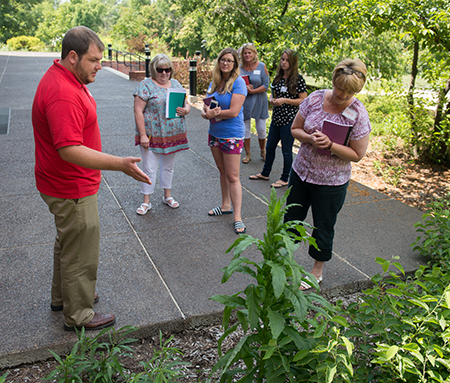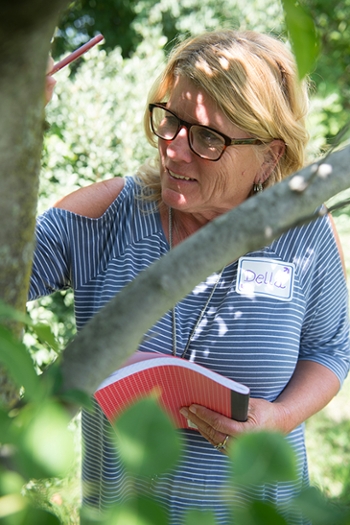 Using the personal notes of some of the greatest scientific minds in history, the Southern Illinois University Edwardsville Center for Science, Technology, Engineering and Mathematics (STEM) Research, Education and Outreach have collaborated once again with the Library of Congress Teaching with Primary Resources program at SIUE to offer a unique workshop for educators from around the region.
Using the personal notes of some of the greatest scientific minds in history, the Southern Illinois University Edwardsville Center for Science, Technology, Engineering and Mathematics (STEM) Research, Education and Outreach have collaborated once again with the Library of Congress Teaching with Primary Resources program at SIUE to offer a unique workshop for educators from around the region.
During the two-day workshop, “STEM Notebooks: Understanding History through a STEM Lens,” teachers worked with notebooks and other materials from famous scientists and other historical figures like Charles Darwin, Alexander Graham Bell, Thomas Jefferson and Clara Barton. The workshop was held on July 25 and 26 in the SIUE STEM Center.
“Throughout the free workshop, we are encouraging students to use STEM notebooks and primary sources to learn strategies in notetaking, while thinking through a STEM lens,” said Amy Wilkinson, program manager of the Library of Congress Teaching with Primary Sources program at SIUE. “While our participants are doing the lessons their students would be doing, they’re also working to understand how best to work STEM Notebooks into their curriculum.”
Throughout the session, participants had time to explore and research primary sources, or artifacts, documents, diaries, manuscripts, autobiographies, recordings or any other sources of information that were created at the time under study, and collaborate with one another. They also received a free STEM notebook to bring back to their classrooms and a flash drive with materials and primary sources used during the workshop.
“By looking at these notebooks, we can understand how these great minds took notes, and the teachers can pass those skills along to their students,” added Matt Johnson, instructional design and curriculum specialist with the SIUE STEM Center.
Hannah Wiggins, an SIUE alumna, is preparing to begin her first year teaching in Nokomis. She attended the workshop with a colleague, Della Montgomery, an elementary education professor from Blackburn College.
“This is the first workshop I have attended, and I’m thrilled to use what I’ve learned here and implement it in my classroom,” Wiggins said. “I know sometimes, it is easy for some teachers to get into a rhythm and teach certain concepts repetitively for years. It’s important to bring in new ideas and always be changing things in your curriculum for your students’ sake.”
 “Hannah is extraordinarily creative,” Montgomery said. “I’m very excited to be able to walk into a classroom and see how she will be able to start affecting her students’ lives with her lessons. With a curriculum infused with STEM, it can open a lot of doors.”
“Hannah is extraordinarily creative,” Montgomery said. “I’m very excited to be able to walk into a classroom and see how she will be able to start affecting her students’ lives with her lessons. With a curriculum infused with STEM, it can open a lot of doors.”
The teachers also embarked on a nature walk on campus and took notes in their own STEM notebooks. They wrote down their own observations about what they saw and noted their questions about how the natural structures grew over time, as well as what animal and plant species inhabited the area.
Along with the nature walk, the participants also engaged in the “data collection Olympics.” In this portion of the workshop, the teachers worked on lessons that helped students effectively record data.
As part of SIUE’s ongoing mission to engage in High Impact Community Engagement Practices, this ongoing relationship between the SIUE STEM Center and the SIUE School of Education, Health and Human Behavior will pay off with dividends in both teachers and children in the community.
“We have enjoyed collaborating with the School and worked diligently to get STEM thinking integrated into the classroom setting,” Johnson said. “Many of the teachers attending this workshop have attended past workshops, and we continue to support them the best we can. Above all, we hope to provide more opportunities to more members of the community to provide more resources to fit their needs.”
The Teaching with Primary Sources Program at SIUE is funded by a grant from the Library of Congress and is a member of the TPS Educational Consortium. Members of the TPS Educational Consortium assist in the design of the TPS Program and offer TPS professional development on an ongoing basis, year-round. The mission of the Teaching with Primary Sources program is to build awareness of the Library's educational initiatives, provide content that promotes the effective educational use of the Library's resources, and offer access to and promote sustained use of the Library's educational resources.
The Library achieves this mission through collaborations between the Library and the K-12 educational community across the United States. The program contributes to the quality of education by assisting teachers in their use of the Library's digitized primary sources to engage students, develop their critical thinking skills and construct knowledge. Learn more about the Library’s TPS program and other resources available to teachers at www.loc.gov/teachers.
Photo: (Upper Right) Matt Johnson, instructional design and curriculum specialist with the SIUE STEM Center, leads a group of teachers on a nature tour during the “STEM Notebooks: Understanding History Through a STEM Lens” workshop.
Della Montgomery, an elementary education professor from Blackburn College, observes a tree during the “STEM Notebooks: Understanding History Through a STEM Lens” workshop.